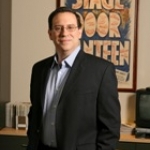
Howard Sherman
Not-For-Profit Arts Are Grossing Me Out
Posted by Mar 14, 2013

Howard Sherman
I have made no secret of my disdain for the practice of announcing theatre grosses as if we were the movie industry. I grudgingly accept that on Broadway, it is a measure of a production’s health in the commercial marketplace, and a message to current and future investors. But no matter where they’re reported, I feel that grosses now overshadow critical or even popular opinion within different audience segments.
A review runs but once, an outlet rarely does more than one feature piece; reports on weekly grosses can become weekly indicators that stretch on for years. If the grosses are an arbiter of what people choose to see, then theatre has jumped the marketing shark.
So it took only one tweet to get me back on my high horse [last week]. A major reporter in a large city (not New York), admirably beating the drum for a company in his area, announced on Twitter that, “[Play] is officially best-selling show in [theatre’s] history.”
When I inquired as to whether that meant highest revenue or most tickets sold, the reporter said that is was highest gross, that they had reused the theatre’s own language, and that they would find out about the actual ticket numbers.” I have not yet seen a follow up, but Twitter can be funny that way.
As the weekly missives about box office records from Broadway prove, we are in an endless cycle of ever-higher grosses, thanks to steady price increases, and ever newer records. That does not necessarily mean that more people are seeing shows; in some cases, the higher revenues are often accompanied by a declining number of patrons. Simply put, even though fewer people may be paying more, the impression given is of overall health.
Read More





 Rohit Bhargava
Rohit Bhargava

 Shoshana Fanizza
Shoshana Fanizza






